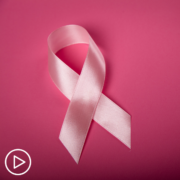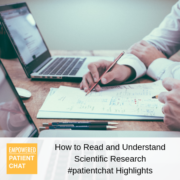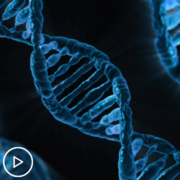How Is Metastatic Breast Cancer Treated?
How Is Metastatic Breast Cancer Treated? from Patient Empowerment Network on Vimeo.
Breast cancer expert Dr. Adrienne Waks discusses treatment approaches for metastatic breast cancer and explains how research is evolving.
Dr. Adrienne Waks is the Associate Director of Clinical Research at Dana-Farber Cancer Institute. To learn more about Dr. Waks click, here.
See More from Thrive Breast Cancer
Related Resources:

|

|

|
Transcript:
Katherine:
What about people who have metastatic disease? What treatment advances are available for them?
Dr. Waks:
Yeah. You know, I think that’s an incredibly important question and a totally different set of discussions than we have with women with early stage breast cancer and unfortunately and unacceptably at this point for a woman diagnosed with metastatic breast cancer still typically that can become a life-threatening diagnosis.
So, it’s exceptionally important that we rapidly improve the treatment options that we have for women with metastatic breast cancer. Maybe everybody says this every year, but I think that this year, 2022, has been a particularly exciting year in terms of advances that we’re making in the treatment of metastatic breast cancer, really of all subtypes. I would say the most exciting class of drugs or type of drugs that’s coming out in breast cancer and in all malignancies honestly, is called antibody drug conjugates, which is to say an antibody. So, a molecule that’s targeted to some particular approaching on a cancer cell surface and then is attached to or conjugated to a chemotherapy molecule.
So, the antibody is like a smart delivery system directly to the cancer cell for what’s call a payload, basically like a sort of action molecule or the killer molecule, which is the chemotherapy.
Those kinds of antibody drug conjugants have made a huge impact in recent years in improving outcomes for women really with all subtypes of breast cancer, so that drug class I think is a very exciting one to watch in general. In terms of specific recent developments in metastatic breast cancer, so probably the biggest blockbuster development over the past year and really over just the past three months is the understanding that we can break out a subtype of metastatic breast cancer that we really didn’t even talk about before which is called HER2-low breast cancer. So, before if you asked me in May of 2022, there really were only two types of HER2 readouts for a breast cancer tumor.
There was a HER2-negative breast cancer tumor and there was a HER2-positive breast cancer tumor and as I already told you, the HER2-positive accounts for about 20 percent of breast cancers overall. The other 80 percent are HER2-negative. And so, historically, again you asked me three months ago I would have said if you’re HER2-positive and that 20 percent will give you these different HER2-directed treatments and if you’re not, we can’t use those. And what’s changed is that we’ve developed new antibody drug conjugants. So, drugs that are targeted against in this case the protein HER2 that seem to be so effective and work so well, that you don’t truly have to be HER2-positive.
You can be HER2-low and still benefit from these treatments, which is to say your cancer has a little bit of HER2 protein on the surface of the breast cancer cells but not a lot. So, not enough to make it positive but enough to make it low in its designation.
That’s actually a large proportion of breast cancer patients. It’s over 50 percent of breast cancer patients, so it’s significantly more than HER2-positive, so a large proportion of breast cancer patients actually fit into this new category called HER2-low and we now know from data that were presented in June of 2022 and then published in the New England Journal of Medicine, which is our biggest most high profile academic medical journal, we know that for patients who fall into that HER2-low category, again that’s more than 50 percent of breast cancer patients, that they can, if they have a metastatic breast cancer, benefit from this new antibody drug conjugate called trastuzumab deruxtecan (Enhertu).
When it was compared to the existing chemo options we have for those patients which do have some efficacy but nonetheless, when trastuzumab deruxtecan was compared to the existing chemo options, it clearly looked better for patients with HER2-low breast cancer. So, that was not just an exciting advance in terms of new treatment options which we always love to be able to offer to patients but also in terms of breaking out this entirely new designation and subcategory that captures more than half of our metastatic breast cancer patients and helping us to offer them something new and hopefully will be a pathway for other drugs to be developed in this space and for this new subcategory.
So, that was very exciting. I’ve been talking about it with patients all the time in the past just three months since those data came out.
You know, a second antibody drug conjugate that has also been very exciting in recent months and recent years is called sacituzumab govitecan which Trodelvy is the brand name of that one. That’s an antibody drug conjugate that’s targeted against a different protein on the cell surface that’s targeted against the protein Trop-2, so that’s where the Trodelvy comes from. It’s targeting Trop-2. That’s an antibody drug conjugate that we’ve known for probably three or more years now can be very effective in triple-negative metastatic breast cancer. So, we’ve had that option for a number of years in metastatic triple-negative breast cancer.
But again, just in the past few months have gotten good and exciting data that this Trodelvy or sacituzumab drug also works in estrogen-driven breast cancers.
And so, it’s giving another option to patients with not just triple-negative but also estrogen-driven breast cancer. So, that was another very recent development just in the last three months or so.
Katherine:
That’s really exciting.










